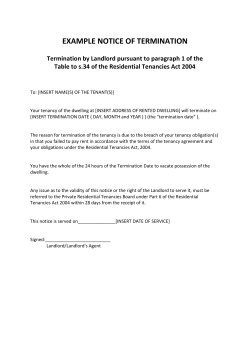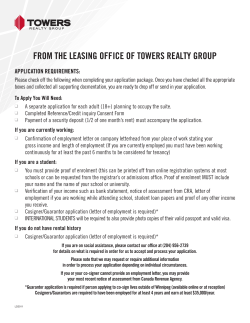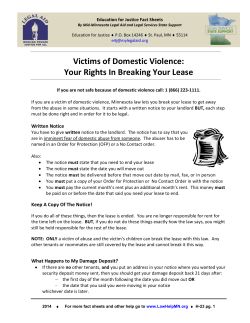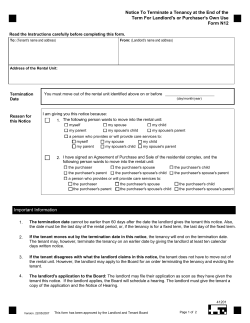
Breaking your lease Q&A: What you need to know
Breaking your lease Q&A: What you need to know When you sign a lease with your landlord, there are important things you need to know before you break it. This fact sheet covers what a lease is, what its legal rammifications are, and what can happen if you break your lease. Q -What is a lease anyway? A – The term ‘lease’ is not used in the Residential Tenancy Act. The Act refers to periodic tenancies and fixed term tenancies. People tend to use the word ‘lease’ when they mean a fixed term tenancy agreement. Therefore, in this factsheet, we are using the term ‘lease’ to refer to a fixed term tenancy agreement. Leases, or fixed term tenancy agreements are different from periodic or month to month tenancies. Q –What is the difference? A – A fixed term tenancy or lease has a start date and an end date and the period is usually for one year. A lease prevents the landlord from ending your tenancy because he or she wants to move back in, or if the rental premises is sold and the new owner wants to move in. They will have to wait till the lease expires. Q -I want to get out of my lease. What kind of notice do I need to give? A – You usually cannot just give a one month notice and break a lease. Remember, you signed a contract which commits you to stay for the full period. So if you found a cheaper place to rent, or you don’t like the place, you can’t give a one month’s notice and walk away. This situation can become quite complicated. There are many things to consider prior to making such a decision. Any written notice you give will legally take effect on the date your lease ends. In other words, no matter what date you want to end your tenancy, the notice will ‘self- www.tenants.bc.ca 1 correct’ to the end of the lease. Q –What are the consequences of breaking a lease? A –Now we all recognize there are events and circumstances that can happen and we may have to break the lease. Legally, you could be responsible for all advertising costs and all lost rent revenue for the balance of the lease period if the landlord is not able to find another tenant to move in. You could also be on the hook for advertising costs incurred by the landlord until the rental unit is re-rented. The first thing you should do is look at your lease agreement. You probably have a ‘liquidated damages’ clause in your lease which usually means you forfeit your security deposit or some other amount if you break the lease. Q – I have five months left on my lease. My landlord told me I have to pay the rent for the next five months’ rent immediately. Is this true? A – No. This is called an ‘acceleration provision’ and you do not have to pay this cost. However, you may have to if the landlord tries to re-rent your place and is not able to do so over the next five months and loses the rent. This is the reality of breaking a lease. Q – Can I sublet my rental unit if I know somebody who wants to take it over? A – It is very important to understand the difference between ‘subletting’ and ‘assigning’ the lease agreement. When a rental unit is assigned, the agreement is between the landlord and the new tenant. When it is sublet, the agreement is between yourself and the new tenant. The new tenant is a subtenant and you will actually be that tenant’s landlord. As well, you are still your landlord’s tenant. If your tenant damages the rental unit or doesn’t pay the rent, you will be responsible. Q –What if my landlord won’t let me do this? A -Your landlord has the right to approve the assignment or sublet. The landlord can check references and can refuse to allow the assignment or sublet if the tenant’s references aren’t good. Also, the landlord cannot unreasonably withhold consent and refuse to allow the assignment or sublet. Section 34 of the Residential Tenancy Act states: www.tenants.bc.ca 2 Assignment and subletting 34 (1) Unless the landlord consents in writing, a tenant must not assign a tenancy agreement or sublet a rental unit. (2) If a fixed term tenancy agreement is for 6 months or more, the landlord must not unreasonably withhold the consent required under subsection (1). (3) A landlord must not charge a tenant anything for considering, investigating or consenting to an assignment or sublease under this section. Q –My landlord is advertising my rental unit for $200 a month more than I was paying. It’s already too expensive which is why I’m moving. Can he do that? A – The Residential Tenancy Act requires both landlords and tenants to mitigate, or minimize, any damage or loss resulting from the other’s non-compliance with the Act, Regulations, or tenancy agreement. This means the landlord has to do whatever is reasonable to minimize any costs or losses. By advertising the rental unit at a higher rate of rent, the landlord is not mitigating the loss. Q – There is a high vacancy rate in my area. My landlord couldn’t find a tenant and lowered the rent by $200 per month. The place was then rented. He has told me I have to pay the $200 difference for the loss of revenue over the next five months. Is this true? A – Generally speaking, yes. He ‘mitigated’ his loss to the best of his abilities by reducing the rent and you likely are responsible for those costs. If you don’t feel you owe this money, your landlord can take legal action at the Residential Tenancy Branch. If he proves his losses to a Dispute Resolution Officer, you could be ordered to pay. Q – My lease has a liquidated damages clause of $1500 and my rent was only $1000 per month. Do I have to pay that? A – A ‘liquidated damages’ clause is a pre-estimate of the landlord’s costs to rerent the rental unit. The amount is to cover the costs to re-rent the unit and must not be so high as to be considered a penalty. Generally speaking, if a liquidated damages clause is high, it may be considered a penalty and may not be enforceable. Keep this in mind. See Residential Tenancy Policy Guideline # 4 – Liquidated Damages. If you feel the amount is too high, contact the Residential Tenancy Branch. www.tenants.bc.ca 3 Q – My landlord refuses to fix anything in my unit. Does this mean I can break my lease? A – Not usually. The ‘breach’ or transgression would have to be so serious that it would be difficult for the tenancy to continue such as a badly leaking roof, collapsed septic field, major structural deficiencies which compromise the tenant’s safety, or if the landlord cut off the hydro or water. In those kinds of situations, the landlord has ‘broken’ the lease. If you choose to move, you are simply ending the tenancy due to the landlord’s ‘breach of lease’. It is possible to seek your moving expenses through the Residential Tenancy Branch in those situations. You will need proof of the reason you moved such as photos or witness statements (this could include contractor statements). You have other legal options available through the Residential Tenancy Branch to deal with necessary repairs. Section 45(3) of the Residential Tenancy Act states: 45 (3) If a landlord has failed to comply with a material term of the tenancy agreement or, in relation to an assisted or supported living tenancy, of the service agreement, and has not corrected the situation within a reasonable period after the tenant gives written notice of the failure, the tenant may end the tenancy effective on a date that is after the date the landlord receives the notice. Remember: A fixed term tenancy or lease does not recognize job loss, changes in financial status, medical issues, health problems, family emergencies, etc. If you have signed a lease, you are expected to complete the term. If you are not comfortable signing a lease or a fixed term tenancy due to the nature of the agreement, you may want to seriously consider the consequences of breaking the lease prior to signing. In reality, it is much easier to start a lease than it is to get out of one. Fact Sheets in other languages are available through TRAC. This fact sheet explains the law in general, but you should not use it as legal advice. Each situation is different, and you may need to get legal help. This information has been produced by TRAC Tenant Resource & Advisory Centre. Feel free to photocopy these fact sheets. Fact sheets may not be commercially reproduced. © 2009 TRAC Tenant Resource & Advisory Centre www.tenants.bc.ca 4
© Copyright 2025





![Sample Letter: Improper Rule Change/Fee or Rent Increase [Date] [Landlord/Manager’s Name]](http://cdn1.abcdocz.com/store/data/000031198_2-6d3ce7b943ede5629a20f08c47060981-250x500.png)















